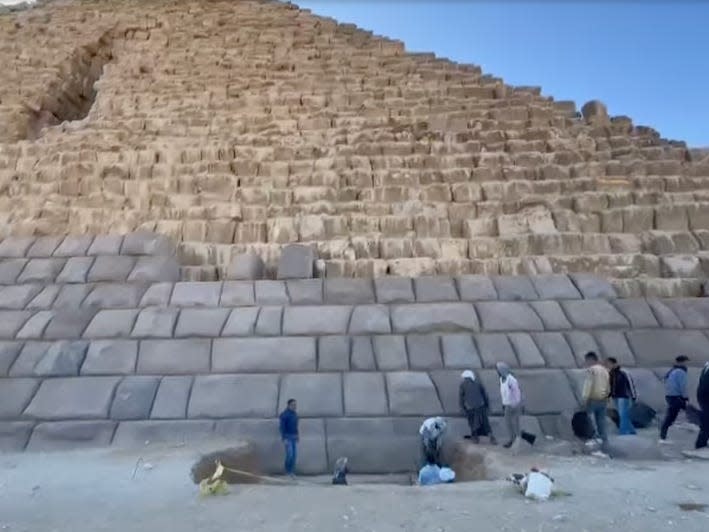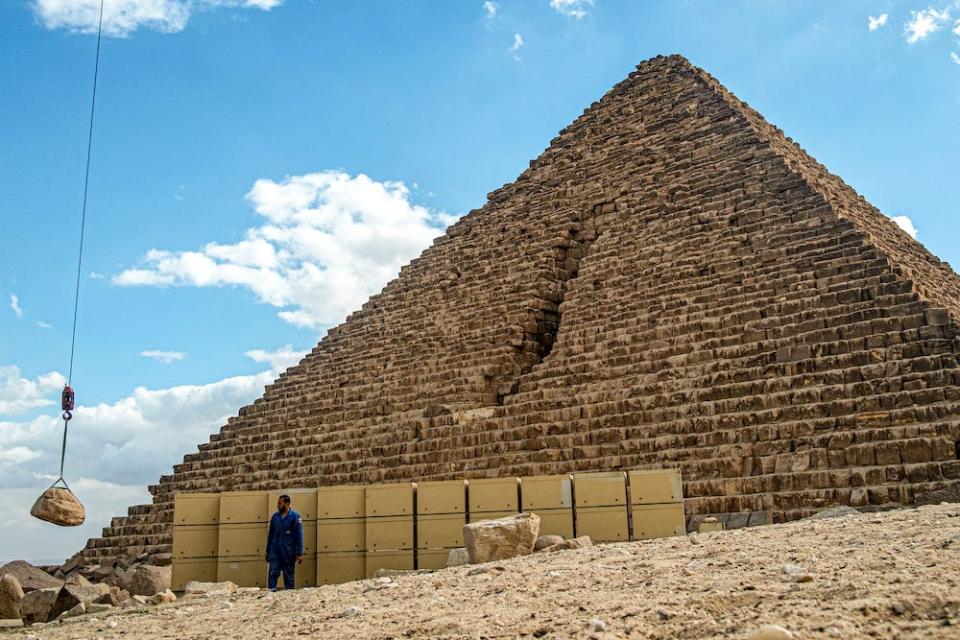Egypt is renovating one of its ancient pyramids using granite, and some heritage experts are horrified

Egypt's antiquities chief announced a project to restore an ancient pyramid's granite cladding.
He called it "Egypt's gift to the world," gesturing to work apparently already begun.
But some heritage experts have called it an "absurdity" that could damage the structure.
A restoration project to cover one of Egypt's most iconic pyramids with granite cladding has produced a decidedly mixed reaction among heritage experts and social media users.
Mostafa Waziri, head of Egypt's Supreme Council of Antiquities, posted a video on Facebook on January 25 announcing the project, which appears to be already underway.
The footage shows Waziri in front of the Menkaure Pyramid, the smallest of the famed structures on the outskirts of Giza, Cairo.
Estimated to have been built almost 5,000 years ago from limestone, granite, and mortar, the pyramid was designed to be the last resting place of the pharaoh Menkaure.
The video shows workers excavating sand from a section of the pyramid's base. Layers of grey blocks are already visible.
The project will span three years and will involve intensive study and documentation, Independent Arabia reported Waziri as saying.
He called it, per The Guardian's translation, "Egypt's gift to the world" — phrasing used at the launch of other projects of considerable national pride, such as the expansion of the Suez Canal.
It will, Waziri said, return the 213-foot pyramid to its original, granite-clad state.

But the reaction from some heritage experts and Egyptologists, and the general public, has been wary.
"When are we going to stop the absurdity in the management of Egyptian heritage?" Egyptologist Monica Hanna said, according to The Telegraph.
Hanna said the intervention goes against all principles of conservation.
"Interfering with the nature of the monument can cause visible problems and major damage," she told Independent Arabia.
Although the project's Japanese partners have the technology, they don't have the archaeological expertise needed, she added.
Hussein Bassir, director of antiquities at the Biblioteca Alexandrina, said that the project should be approached with enormous caution and only after considering multiple risks, the outlet reported.
Meanwhile, Salima Ikram, an Egyptologist at the American University in Cairo, told the outlet that the project could work "as long as the stones used are the ones found around it, and not adding new ones that do not belong to the pyramid."
It's unclear if that is part of the plan.
Social media commenters poured scorn on the project. "When will the project to straighten the Tower of Pisa be planned?" one wrote, according to France 24.
Another said, per The Guardian: "Rather than tiles, why not wallpaper the pyramids?"
The strong reactions have caused Egypt's Ministry of Antiquities to call for a pause to reexamine the project's feasibility, according to the Telegraph.
Correction: January 31, 2024 — An earlier version of this story gave an incorrect name for the pharoah the pyramid was built for, who was called Menkaure, not Khufu.
Read the original article on Business Insider


